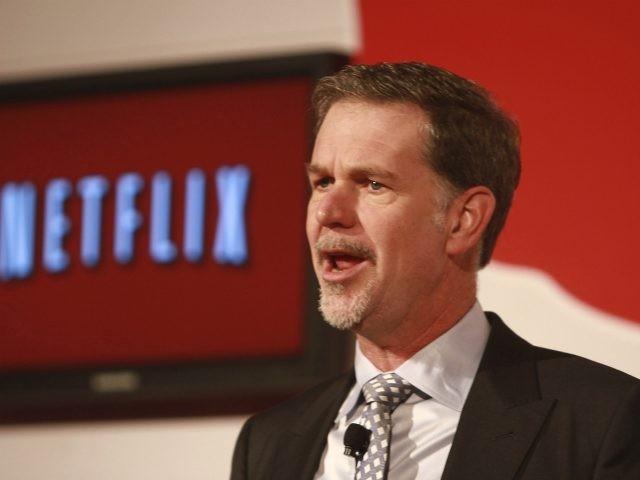Appearing Tuesday at the New York Times’ Dealbook conference, Netflix CEO Reed Hastings attempted to explain away the streaming giant’s decision to censor one of its programs in Saudi Arabia, contending “we’re not trying to do truth to power.”
Hastings’s admission came in response to interviewer Andrew Sorkin’s question about why Netflix pulled an episode of comedian Hasan Minhaj’s show Patriot Act in Saudi Arabia following a meltdown by the Islamic country.
“We’re not in the news business, we’re not trying to do truth to power. We’re trying to entertain,” Hastings explained to Sorkin when asked about the move.
“We can pick fights with governments about newsy topics or we can say, because the Saudi government allows us to have shows like Sex Education, that show a very liberal lifestyle and very provocative and important topics,” the Netflix chief executive added. “We can accomplish a lot more by being entertainment and influencing a global conversation about how people live than trying to be another news channel.”
Sorkin, seemingly unsatisfied with what Hastings’ rationale as to why Netflix need not stand up for freedom of speech, reminded the silicon valley leader that his company has engaged in hot-button political issues at home. In the spring, Netflix, along with Disney and other major entertainment giants, threatened to boycott Georgia due its pro-life “heartbeat” law, which prohibits abortions in the state after a heartbeat is detected.
“If they came to us and said, ‘You can’t have gay content,’ we wouldn’t do that. We would not comply with that,” Hastings responded to the Times’ reporter’s pointed question.
“Hasan’s enormously funny, interesting, and he’s, you know, one more quite justified critique of MBS, but that’s just, like, not our core brand, that’s a news kind of thing,” Hastings went on. “It’s tough. If you want to be a news brand, then you have a different set of things that you do. And if you want to be an entertainment brand and it’s really about sharing lifestyles, then you do have to draw hard lines, but they’re around things that are around lifestyle, not, you know, the current news.”
Earlier this year, Netflix faced criticism from human rights groups for pulling an episode in Saudi Arabia of comedian Hasan Minhaj’s Patriot Act series that criticized the kingdom’s powerful crown prince.
The American comedian used his second episode, released last October, to criticize Crown Prince Mohammed bin Salman over the killing of writer Jamal Khashoggi and the Saudi-led coalition at war in Yemen.
Human rights group Amnesty International said Saudi Arabia’s censorship of Netflix is “further proof of a relentless crackdown on freedom of expression.” PEN America, the literary and human rights organization, said the move “legitimizes repression.” Netflix said it was simply complying with a local law.
Khashoggi, who wrote critically of the crown prince in columns for the newspaper, was killed and dismembered by Saudi agents inside the Saudi consulate in Istanbul last year. The Senate has said it believes the crown prince is responsible for the grisly killing, despite insistence by the kingdom that he had no knowledge of the operation.
“It blows my mind that it took the killing of a Washington Post journalist for everyone to go: ‘Oh I guess he’s not really a reformer,’” Minhaj said in the episode.
Netflix, in a statement at the time, said the episode was removed from the kingdom as a result of a legal request from authorities and not due to its content.
“We strongly support artistic freedom worldwide and removed this episode only in Saudi Arabia after we had received a valid legal demand from the government — and to comply with local law,” the streaming giant said.
Minhaj, a former correspondent with The Daily Show on Comedy Central, told The Associated Press this summer that his Netflix show would fuse his personal narrative as a first-generation Indian-American with the current political and social backdrop to examine deep issues confronting the world.
In the roughly 18-minute now-censored Patriot Act monologue, Minhaj also mentions the ruling Al Saud family and its vast wealth, saying: “Saudi Arabia is crazy. One giant family controls everything.”
In a tweet, Minhaj mocked the censorship attempt, pointing out that the episode banned from the kingdom is available elsewhere online.
“Clearly, the best way to stop people from watching something is to ban it, make it trend online, and then leave it up on YouTube,” he wrote.
The Associated Press contributed to this report.

COMMENTS
Please let us know if you're having issues with commenting.